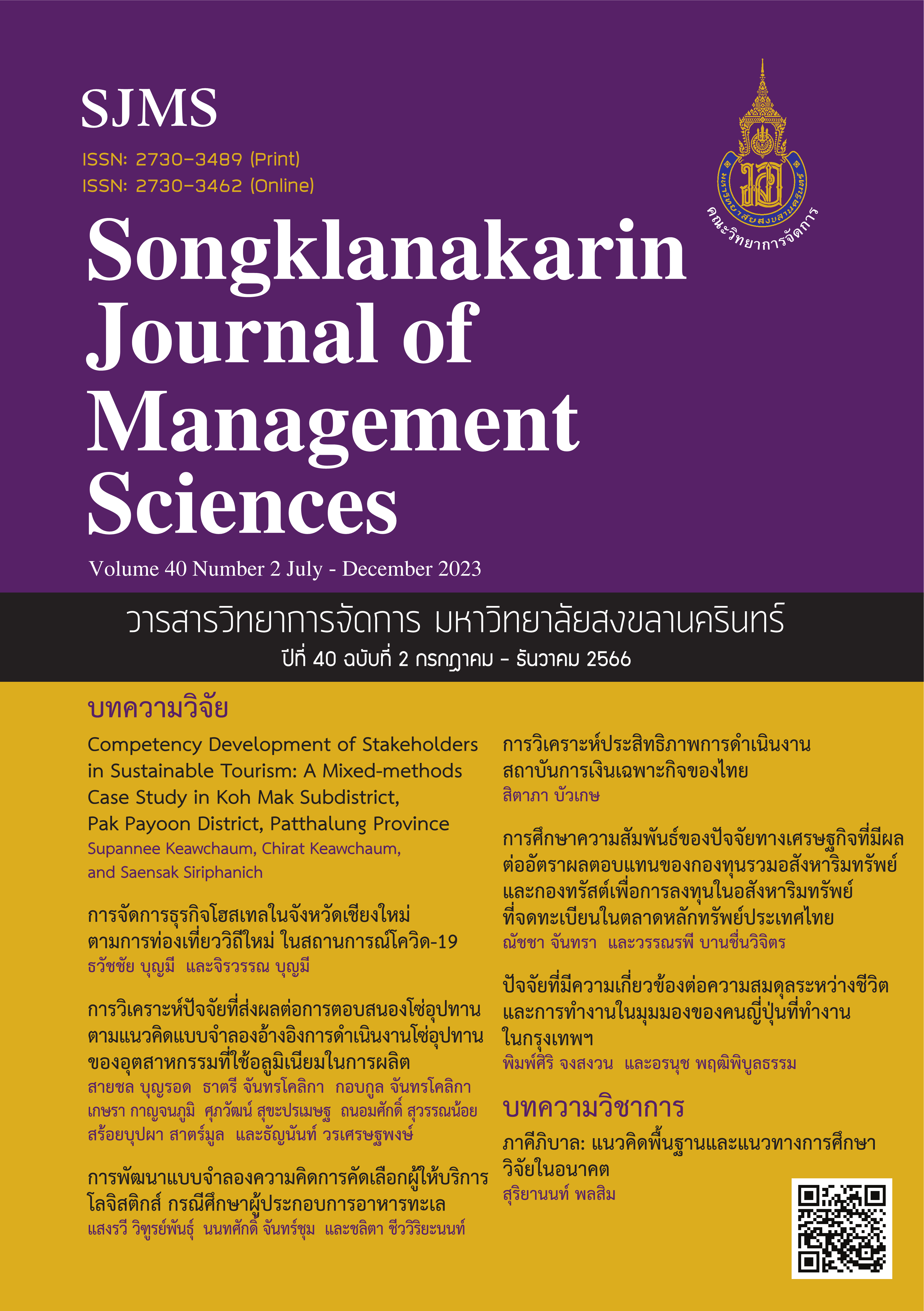Competency Development of Stakeholders in Sustainable Tourism: A Mixed-methods Case Study in Koh Mak Subdistrict, Pak Payoon District, Patthalung Province
Main Article Content
Abstract
This study aims to determine how to enhance stakeholder participation in sustainable tourism in Koh Mak subdistrict, Pak Payoon district, Patthalung province, Thailand. The research sample included 39 individuals from the community, private, and public sectors. This study is a mixed-methods investigation that combines quantitative and qualitative findings to confirm their consistency. Data from the quantitative research was analyzed by comparing the mean scores before and after the competency development process for sustainable tourism. Data from the qualitative research was analyzed by content analysis. The quantitative research revealed that the overall and dimensionally average scores increased after the competency development process. However, statistical analysis revealed that the mean scores were not different before and after the intervention. The qualitative research demonstrated an increase in stakeholders' competence in sustainable tourism. Due to the fact that competency development is a time-consuming and ongoing activity, it takes time to grasp the results clearly. Generally, the findings indicate that organizations involved in the tourism industry must comprehend and consistently implement the competency development process to enable communities to perform better and effectively manage sustainable tourism.
Article Details

This work is licensed under a Creative Commons Attribution-NonCommercial-NoDerivatives 4.0 International License.
All published articles are SJMS’s copyright. The editorial board allows all published articles to be copied, excerpted, or disseminated with academic citation.
References
Almalki, S. (2016). Integrating Quantitative and Qualitative Data in Mixed Methods Research--Challenges and Benefits. Journal of education and learning, 5(3), 288-296.
Argyris, C. (1976). Theories of action that inhibit individual learning. American Psychologist, 31(9), 638–654.
Asmelash, A. G., & Kumar, S. (2019). Assessing progress of tourism sustainability: Developing and validating sustainability indicators. Tourism Management, 71, 67-83.
Ateljevic, I. (2020). Transforming the (tourism) world for good and (re) generating the potential ‘new normal’. Tourism Geographies, 22(3), 467-475.
Bramwell, B., & Lane, B. (1993). Sustainable tourism: An evolving global approach. Journal of Sustainable Tourism, 1(1), 1-5.
Budeanu, A., Miller, G., Moscardo, G., & Ooi, C. S. (2016). Sustainable tourism, progress, challenges and opportunities: An introduction. Journal of Cleaner Production, 111, 285-294.
Dangi, T. B., & Petrick, J. F. (2021). Augmenting the role of tourism governance in addressing destination justice, ethics, and equity for sustainable community-based tourism. Tourism and Hospitality, 2(1), 15-42.
GSTC. (2013). Global sustainable tourism council criteria. Retrieved September 15, 2022, from https://www.gstcouncil.org/wp-content/uploads/GSTC-Destination-Criteria-and-indicators-v1-Dec-2013.pdf
Hunter, C. (1997). Sustainable tourism as an adaptive paradigm. Annals of Tourism Research, 24(4), 850-867.
Jacob, R., & Washington, C. (2010). Employee development and organizational performance: A review of literature and directions for future research. Human Resource Development International, 6(3), 343-354.
Kapera, I. (2018). Sustainable tourism development efforts by local governments in Poland. Sustainable Cities and Society, 40(2018), 581-588.
Khan, A., Bibi, S., Lyu, J., Raza, A., Hayat, H., & Meo, M. S. (2020). Unraveling the nexuses of tourism, terrorism, and well-being: Evidence from Pakistan. Journal of Hospitality & Tourism Research, 44(6), 974-1001.
Lee, T. H. (2013). Influence analysis of community resident support for sustainable tourism development. Tourism Management, 34, 37-46.
Leimbach, M. (2010). Learning transfer model: A research-driven approach to enhancing learning effectiveness. Industrial and Commercial Training, 42(2), 81-86.
Martins, P. G., Ferreira, A. M., & Costa, C. M. (2022). Tourism and third sector organizations: Synergies for responsible tourism development?, Tourism & Management Studies, 18(1), 7-16.
Randall, J., & Sim, A. (2014). Managing people at work. London: Routledge.
Spencer, L. M., & Spencer, P. S. M. (2008). Competence at work models for superior performance. John Wiley & Sons.
Streimikiene, D., Svagzdiene, B., Jasinskas, E., & Simanavicius, A. (2021). Sustainable tourism development and competitiveness: The systematic literature review. Sustainable Development, 29(1), 259-271.
Swanson, R. A., & Holton, E. F. (2009). Foundation of human resource development. San Francisco: Berrett-Koehler.
Tolkach, D., & Pratt, S. (2019). Globalisation and cultural change in Pacific Island countries: The role of tourism, Tourism Geographies, 23(3), 371-396.
World Economic Forum. (2019). The Travel & Tourism Competitiveness Report 2019. Retrieved September 15, 2022, from https://www3.weforum.org/docs/WEF_TTCR_2019.pdf
Younas, M., & Waseem Bari, M. (2020). The relationship between talent management practices and retention of generation ‘Y’employees: mediating role of competency development. Economic Research-Ekonomska istraživanja, 33(1), 1330-1353.

